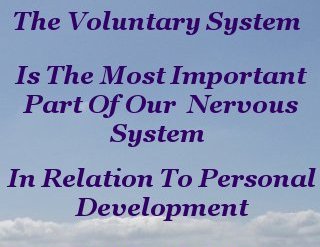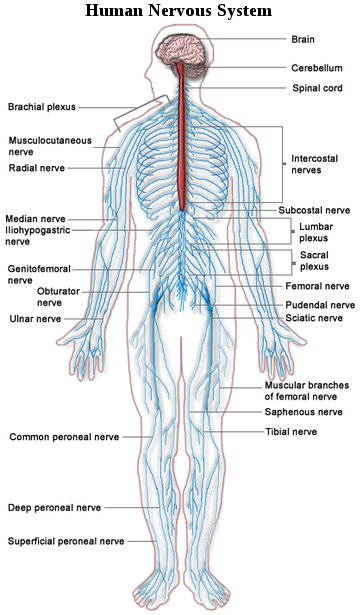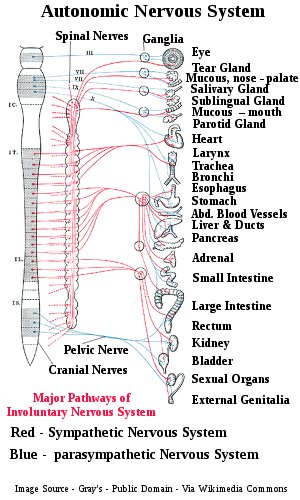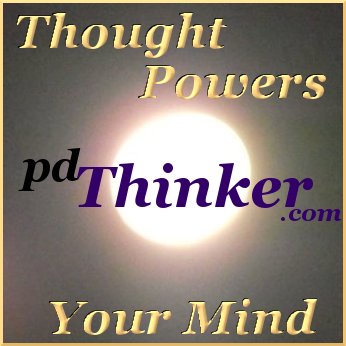Brief Overview Of Nervous System Activities
Part 6 - Part 5
Overview Of Nervous System
Embracing
an overview of Nervous System activities provides many
insights into Human behavior, and helps to lay a solid foundation for
a successful Personal Development plan.
To kick off this brief overview of our Nervous System, we can begin by identifying the various components, and the role they play, as we go about life.
Understanding just how our Nervous System functions, both the voluntarily, and involuntarily elements, makes it easier to respond to, and influence, our Moods and Behavior for our own benefit.
A thorough comprehension of the Human Nervous System is an indispensable aid, when one is dealing with our fellows and their sometimes, nay, not sometimes, but often, inexplicably confounding Attitudes and Behavior.
One Nervous System
We Possess one Nervous System, comprising the following components, that, in alliance with it's major partner component, the Brain, is capable of working in complete Harmony for the benefit of it's owner.
As owner and director of their Voluntary Nervous System, an individual is entirely responsible for it's State of Maintenance. Hence the necessity for taking charge if we are to progress with developing our Mind.
Central Nervous System
Peripheral Nervous System
Anatomical Nervous System
Sympathetic Nervous System
Parasympathetic Nervous System
Voluntary Nervous System
Image - Persian Poet Gal - Public Domain - Via WikiMedia Commons
Central and Peripheral Nervous Systems
The Central Nervous System is composed of the Brain and Spinal cord. All the Nerves external to the Brain and Spinal Cord are considered to belong to the Peripheral Nervous System, which extends to the rest of the Body.
By forming a vast network of Nervous connections to and from the Brain, to all components of the Physique, the Central Nervous System manages signals throughout the Body via the Peripheral Nervous System.
Both Voluntary, and Involuntary, systems, are incorporated, and their functions executed, within this dense network.
Although it is considered as one entity, the Human Nervous System can be divided into two distinct modes of operation, as follows below.
Involuntary and Voluntary Nervous Systems
Much of our Brain mass is devoted to Involuntary functions, such as Blood Circulation, Sugar Levels, and Body Temperature.
Other Involuntary functions are Breathing, Digestion, Damaged cell Repair etc, and generally maintaining body Homeostasis. That is, Balanced Internal Conditions, regardless of external environment conditions - until, or unless, a threat appears. If, or when, we face a threat, our Sympathetic Nervous System prepares our body for such an event.
In common with many of our fellow creatures, Humans are self regulating, self maintaining machines. Featuring powerful Emotions.
Even having all our Biological activities adequately catered for, the redundant capacity of the Human Brain is substantial, and can be considered to be available to devote to Intelligence and Cognitive pursuits. Including directing competent conduct.
Brain structure automation leaves one free to concentrate on, and develop, this Intelligence. Along with our cognitive, and other, abilities and capacities.
Involuntary Nervous System
As it's precise title suggests, the Involuntary System, or Autonomic Nervous System is entirely automatic.
Notwithstanding it is known to be possible for an individual to access Conscious control over his or her Heart Beat, via biofeedback, and Consciously influence other functions, evidenced by a few extreme feats in extreme sports, it is not possible for any individual to Consciously override the Autonomic Nervous System and take complete control.
Most of us would agree this is a responsibly we would prefer not to have to shoulder ?
But there is much we can do to alleviate the stress modern living places on our Involuntary Nervous System, by taking charge of our Voluntary Nervous System.
The Involuntary Nervous System is divided into two subsystems, recognized respectively as the Sympathetic, and Parasympathetic.
Sympathetic Nervous System
The Sympathetic Nervous System organizes the Body, in preparation for Fight or Flight in response to perceived threats. Whether threats are real or imagined, matters not. It sallies forth and accomplishes this readiness via Chemical and Electrical signals with distressing and disturbing consequences, including:
- Elevating Heartbeat and Blood Pressure way above normal.
- Suppression of the Immune System.
- Shutting down the Digestive System.
- Increasing Blood flow to the Body Muscles by reducing the flow to the Inner Organs and Skin.
- Releasing Glucose from the Liver into the Bloodstream in expectation of extreme activity.
- Increasing Dilation of the Pupils to allow excess Light in, and often, some form of Sweating.
Apart from increased Heart Beat, arising from purposeful exercise, and Sweating, every one of these conditions is disruptive to Homeostasis and detrimental to Health. Particularly long term Health, if the sympathetic response is permitted to persist.
This is an excellent opportunity to pause for a moment and consider that one's Homeostasis is a direct outcome of the Thoughts we allow ourselves to Think.
Parasympathetic (Voluntary Nervous System)
The Sympathetic Nervous System's counterpart, the Parasympathetic, works diligently and unobtrusively in the background to perform Maintenance. In order to Repair, Relax, and Balance the Body's requirements when the Sympathetic is not activated.
In Modern Society, our Parasympathetic System tends to endure an unnecessarily heavy workload. But thankfully, by learning and applying the skills offered by Personal Development there is much we can do to reduce this inordinate burden.
Taking Charge
The Voluntary Nervous System is the most important aspect of our overview of Nervous System functions, in relation to Personal Development.

This is the element of our Nervous make-up that permits influence over our Conscious physical activities, our Emotions, and our Thought. And it is the instrument used for Personal Development.
Practicing wise Personal Development embodies nothing less than taking complete charge of, and responsibility for, this Voluntary System.
One of the numerous benefits of taking charge is being able to beneficially influence and regulate your amenable Autonomic Nervous System.
Beneficially influencing your Autonomic System encourages desirably sound, psychological and physical health. An essential requirement in the process of liberating your Mind Power.
A definite realization, and belief that this responsibility of taking charge can be achieved, and maintained, underpins progress one makes on his or her journey to enlightenment. You are on the path of taking charge of your Thoughts, and hence Mind.
Somewhere along this journey you will conclude that Thought Powers your Mind
Hopefully, this all too brief overview of Nervous System functions has whet your appetite to learn more about how you tick.
The Human Nervous System Rocks!
Part 6 - Part 5







